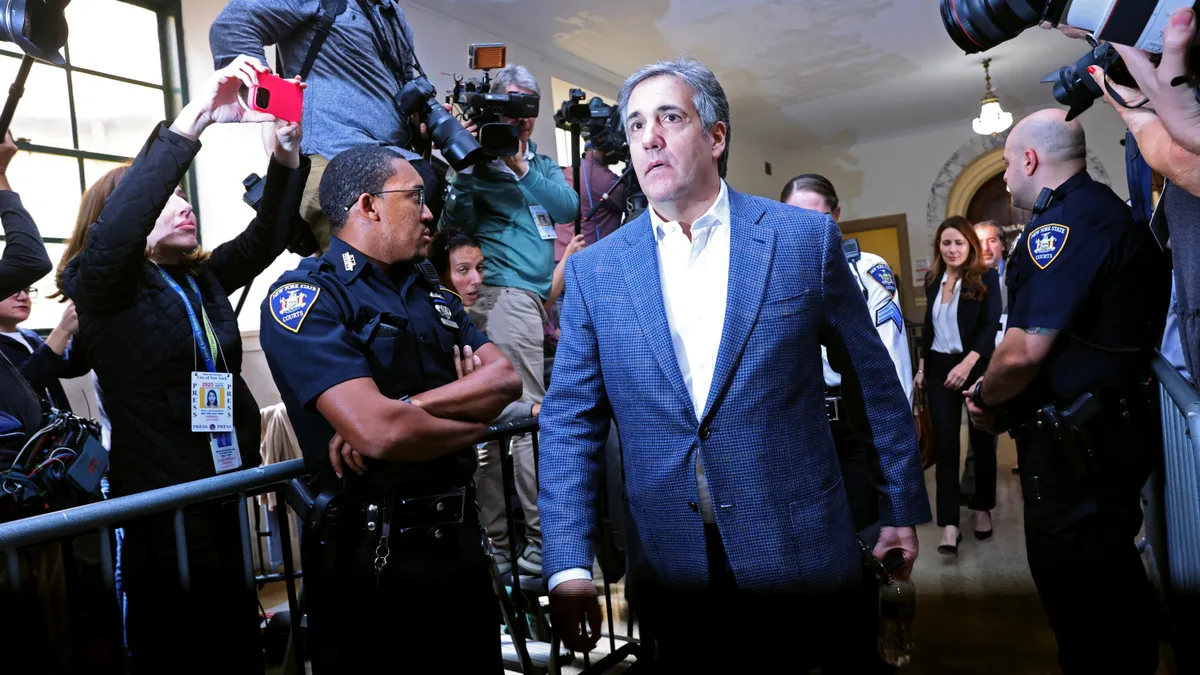Michael Cohen — former president Trump’s ex-attorney and so-called “fixer” who pleaded guilty in 2018 to lying to Congress and other charges — testified Tuesday in the $250 million civil fraud case against his former employer that he and ex-CFO Allen Weisselberg manipulated valuations in order to end up with the numbers Trump wanted.
Taking the witness stand wearing a blazer and white button-down shirt as Trump looked on in a suit and blue tie with his arms crossed, Cohen described how he was asked by Trump “to increase the value of assets based upon a number he arbitrarily elected and my responsibility, along with Mr. Weisselberg’s, was to reverse engineer the various different asset classes to increase those assets’ values in order to achieve the number that Mr. Trump had tasked us with.”
Cohen is a key witness for the state and not a defendant in New York Attorney General Letitia James’ case which alleges the former president — with help from some of his children and senior executives at the Trump Organization including Weisselberg — falsely inflated his net worth by billions of dollars to secure bank loans for the company on more favorable terms than would otherwise have been available to the company, among other motives.
Trump denies any wrongdoing and he and his attorney have argued that valuations are subjective, with Trump citing disclaimers in the documents that he said leave him off the hook. “We did nothing wrong and that's the truth," Trump told reporters as he entered the courthouse Tuesday, according to Reuters.
The case is a cautionary tale for CFOs and accountants regarding the potentially serious costs of fraud or flawed financial reporting.
Depending on the case’s outcome, it could jeopardize the future of the Trump Organization: James is seeking a $250 million ruling against Trump and his co-defendants and also wants the court to bar the former president and the Trump Organization from entering into commercial real estate transactions in New York for five years, and to permanently bar the former president from serving as an officer of a New York corporation.
Jack Castonguay, an assistant professor of finance at Hofstra University in New York, said the case provides some teachable moments for executives and accountants in training regarding the need to push back against superiors who would ask that values be inflated.
“You’ll likely get people telling you this is common, but I disagree,” Castonguay said in an email. “This would violate the [American Institute of Certified Public Accountant’s] ethical standards which all practicing CPAs are bound by and would lead to them losing their CPA license if found to have violated them. CPAs cannot knowingly provide false information to end users, regardless of what their supervisor wants.”
Further, he said due to newly issued Non-compliance with Laws and Regulations standards for accountants, their accountants in practice would now be required to consider reporting such frauds to the appropriate authorities, although he noted this standard wasn’t in place for much of the time period covered in this fraud trial.
James has said that Cohen’s 2019 testimony to Congress, that Trump had a history of misrepresenting the value of his assets to get better treatment with regard to taxes and loans, was the impetus for her civil suit, the Associated Press reported. Cohen served time in prison after pleading guilty in 2018 to tax evasion, lying to Congress and campaign finance violations, partly in connection with his role arranging hush-money payments to women during Trump’s 2016 presidential campaign, according to the Associated Press report.
Chris Kise, an attorney for the Trump team, did not immediately respond to a request for comment on the testimony.














